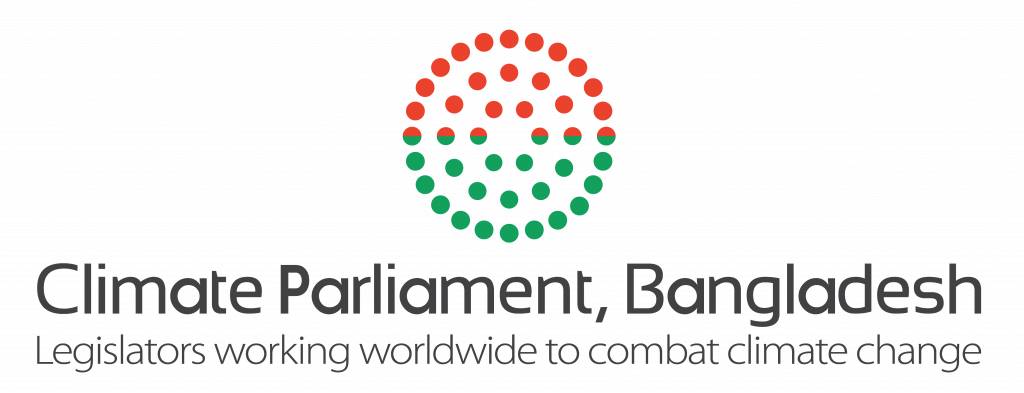Activities
CLIMATE PARLIAMENT BANGLADESH ACTIVITIES
Climate Parliament group of MPs have played a major role in the passage of the sustainable and Renewable Energy Development Agency (SREDA) Act in 2012. After repeated meetings between MPs, Government officials and Ministers, Climate Parliament MPs achieved a milestone in their efforts to create a “Special Renewable Energy Fund” in the national budget and implementation of SREDA was finally realized in 2014-15.
In September 2012
Members of Parliament from different political parties formed a Climate Parliament Group in their Parliament. They decided to take up various parliamentary actions headed by TANVIR SHAKIL JOY, MP as Convener and Zunaid Ahmed Palak, MP as co-convener to scale up contributions of renewable energy for electricity production and to create an enabling environment and policy, finance and technology support, to encourage the use of renewables.
In September 2014
Parliament Bangladesh organized a round table meeting on ‘Renewable Energy Fund: Planning the Road Map ‘at Bidyut Shaban, Ministry of Power, Energy and Mineral Resources. They discussed to establish the Fund and they are going to use this fund for renewable energies.


Back in March 2015
They had the pre-budget meeting with the Bangladesh State Minister of Power, Energy and Mineral Resources, the Climate Parliament Bangladesh group of MPs also submitted a Memorandum to the Minister. The Memorandum asked the government to announce the establishment of SREDA and requisite budget allocation. They also asked for the establishment of the Clean Energy Fund for domestic Renewable Energy manufacturing and supply.
In May 2015, Climate Parliament Bangladesh met the Ministry of Finance officials and SREDA officials to initiate a dialogue on transfer and utilization of renewable energy fund to SREDA

Climate Parliament of Bangladesh carried out a strong campaign for adequate budgetary allocation for SREDA and establishment of the Renewable Energy Fund before the budget of 2014-15. The campaign proved successful when Budget of 2014-15 announced to produce, 800 MW of electricity by 2015 using renewable energy, a Special Fund under the name of “RENEWABLE ENERGY FUND” has been kept in the budget to finance renewable energy-based power plants or projects. The size of the fund allocation was at TK 400 crore with that year’s allocation.

Parliamentarian’s Visit to Climate Vulnerable Areas
A delegation team from the Climate Parliament visited Satkhira and Mongla districts on October 2-3 and Gaibandha and Nilphamari on October 6-7 in 2021. During the visit, the delegation team inspected several adaptation and mitigation projects, meet with local people and stakeholders and discuss with the local government about climate change impacts.
Four oversight Visits
Outcome of this four oversight visits
- Char Development Board in the northern region
- Strong Embankment in the southern region
- Enhance resilience to climate change and natural disasters
- Sustainable use of natural resources
Objectives of Oversight Visit
- Allow Members of the Climate Parliament Bangladesh to observe the Government’s Climate Finance Project implementation and social impacts.
- Support parliamentarians to understand the linkages between the local projects and climate finance efficacy.
- Interact with the Government and Non-Government counterparts to increase better climate governance at the local level.
- Engagement of the climate vulnerable communities, local stakeholders & parliamentarians especially young people to enhance performance of the project.
After the visit, the members of parliament and the youth had a dialogue at the national level on October 9 to decide what to do next, as well as plan how to raise the voice of the grassroots at the COP-26 conference.
Detailed description of each of the activities are given in the next section. On 25th of September,2021 Climate Parliament Bangladesh, Executive members held a meeting on Youth Action: Improvement Climate Finance Efficiency in Bangladesh. Where they said that ensuring the proper use of climate justice is just as important as obtaining funding. Human rights are being violated due to climate change. Sustainable development activities are being hampered. So, there is no alternative to youth partnership with MPs to ensure good climate governance. Initiatives must be taken now for present and future generations. A delegation team from the Climate Parliament will visit Satkhira and Khulna districts on October 2-3 and Gaibandha and Nilphamari on October 6-7. During the visit, the delegation team will inspect several adaptation and mitigation projects, meet with local people and stakeholders, and discuss with the local government about climate change impacts.
NATIONAL LEVEL DIALOGUE
National Level Dialogue on Youth Action: Improvement Climate Finance Efficiency in Bangladesh’. The dialogue was jointly organized by the Climate Parliament, Pratik Youth Parliament, Youthnet for Climate Justice and The Earth Society at Hotel Pan Pacific Sonargaon on 9th of October,2021. It also supports the British Council’s PROKAS programme under the Climate Finance Project.
In the dialogue, young delegates from different districts shared their experiences with the members of the National Parliaments. At the same time, the youths demanded to take the views of the youths the process of government evaluation and monitoring of climate related projects.
Key Observation and Findings from the Oversight Visit
Golakhali, Shyamnagar, Satkhira District
Sustainable embankment to save the people of Satkhira from being flooded. Their children can’t go to school because they have to cross a river, they don’t have any road or bridge. Pregnant women, children and elderly people are severely affected by health issues, due to lack of clinics they don’t get proper treatment. Working in saline water for a long period of time damages their different organs as well as hypertension and they have the Risk of (Pre) Eclampsia and Gestational Hypertension. Local people are migrating from crisis situations to other places for safety. Losing every single belonging every year vulnerable economic conditions force them to seek better earning opportunities in other areas of Bangladesh. The crisis could be tackled if the climate projects were implemented properly. This requires strong monitoring, transparent tender process and proper management. Various projects and initiatives are being taken to tackle climate change. However, there are doubts about the quality of many projects. Integrity is absent in these places.
Visit description: On 2nd of October, 2021 a delegation team led by Nahim Razzaq, convener of Climate Parliament Bangladesh and Member of Parliament, Shariatpur-3 constituency. visited Golakhali village near Sundarbans in Shyamnagar upazila. During this time they talked to the people of Golakhali village and inquired about various aspects of their life.
Kanainagar, Chandpai Union, Mongla
The Climate Parliament delegation heard the pleas of the climate victims voice of Kanainagar village ‘Quantity and diversity of fishes are drastically reducedOur fish are out. The vegetable fields are ruined by saline water. We are in a lot of trouble. Please arrange such facilities for us to get some fresh water from the saline water. The dam was built twice but broke. Make a strong dam for us,” said Sonali Sardar, 35, a housewife from Kanainagar village in Chandpai Union,Bagerhat. Sonali pleads, ‘We are poor, we are hungry. Our livelihoods are gone; we want our children to live like human beings Sonali was expressing her grief to the delegation of Climate Parliament Bangladesh. They demanded sustainable embankments and potable water.
Visit description: Before visiting the Kanainagar, on 3rd of October,2021 Climate Parliament Bangladesh one delegation tearn inspected 100 MW (AC) PV Based Grid Solar Park Project in Mongla. Climate Parliament Bangladesh Convener Parliament Member Nahim Razzaq, MP and Basanti Chakma, MP inspected the project of Orion group of Energon Renewables (BD) Ltd. Salman Obaidul Karim, Management Director of Orion group of the project, narrated a lot of information about the Solar Park. Meanwhile, the Climate Parliament Bangladesh delegation called for increasing private sector investment in the renewable energy sector.
Fulchori and Gaibandha
Affected people said that the crop is being damaged due to various diseases and drought due to climate change. Every year they are facing river erosion and different char lands raising in the middle of the river. People are moving to other places but as they are financially poor, they are living a miserable life. 4 lakh people of Gaibandha Sadar, Sundarganj, Fulchhari and Saghata upazilas have lost everything due to the erosion of Brahmaputra, Teesta and Jamuna rivers. Although the national budget allocates funds for the development of the people of Char every year, the allocated money are not utilized properly. In order to deal with this damage, construction of sluice gates, piling to prevent erosion, dredging of river banks, digging of canals for drainage of beels, construction of drain to prevent river erosion and adaptation measures should be taken to prevent relocation of displaced people.
Visit description: On 6th of October, 2021 Climate Parliament Bangladesh, visited the char lands of Gaibandha. They inspected the char lands and saw river erosion very closely.
Dimla Teesta Barrage, Nilphamari
People of the Dimla live close to the embankment, as the embankment is not strong almost every year they are inundated under water. Two words in this area already went under water. And most of the people shift to the cities. They are living a very difficult life up there. They want a sustainable embankment as well as the Char Development Board. They said that Prime Minister Sheikh Hasina is adopting a master plan for the management of the Teesta River at a cost of around Tk 8,500 crore on a priority basis as part of climate adaptation capacity. Not only Teesta, but also the excavation of tributaries of the Teesta is a matter of time to get rid of the adverse effects of climate change. Teesta river management means not only water management, but also the biodiversity around the Teesta, the livelihood of the Teesta-dependent people, and the management of the Teesta basin is equally important. Scientific excavation of rivers, protection of banks, opening of tributaries, excavation of tributaries is essential for the sake of lives. Reservoirs will also have to be constructed to retain river water during the monsoon season. Arrangements need to be made to protect river-side agricultural management and cooperative agriculture for the poor farmers. The speakers hoped that the people on the banks of the river in five districts would be protected from erosion if the two banks of the Teesta were well managed.
Visit description: It is not possible for Bangladesh alone to deal with the global climate crisis. For this we have to deal with it globally. Joint river and water management is a very important issue because the climate crisis also means water crisis. Climate Parliament Bangladesh, a group of MPs on climate change, has emphasized on the overall management of the Teesta River building climate adaptation and tolerance in the river basin. Climate parliament members made the remarks at a dialogue on climate change at the meeting room of the Daliya Water Development Board’s Obosor in Nilphamari’s Dimla Upazila on 7th of October, 2021.













